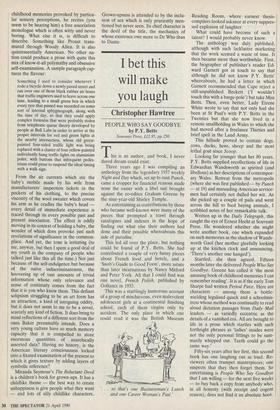I bet this
will make
you laugh
Christopher Hawtree
PEOPLE WHO SAY GOODBYE by P.Y. Betts
Souvenir Press, £12.95, pp.250
This is an author, and book, I never dared dream could exist.
Three years ago I was compiling an anthology from the legendary 1937 weekly Night and Day which, set up to oust Punch, came a cropper for financial reasons made none the easier with a libel suit brought against the co-editor Graham Greene by the nine-year-old Shirley Temple.
As entertaining as contributions by those who became well-known were many of the pieces that prompted a trawl through catalogues and indexes in the hope of finding out what else their authors had done and their possible whereabouts this side of paradise.
This led all over the place, but nothing could be found of P.Y. Betts. She had contributed a couple of very funny pieces about French food and hotels, and a 'Snob's Guide to Good Form', more astute than later incarnations by Nancy Mitford and Peter York. All that I could find was one novel, French Polish, published by Gollancz in 1933.
This was a startlingly humorous account of a group of mischievous, even malevolent adolescent girls at a continental finishing school, each of them virgins only by accident. The only place in which one could read it was the British Museum ' . . . so that's one Businessman's Lunch and one Career Woman's Pate.' Reading Room, where earnest thesis- compilers looked askance at every suppres- sed explosion of laughter.
What could have become of such a talent? I would probably never know.
The anthology was duly published, although with such lacklustre marketing that the work seemed a waste of time. It then became more than worthwhile. First, the biographer of publisher's reader Ed- ward Garnett got in touch to say that although he did not know P.Y. Betts' whereabouts, he had a letter in which Garnett recommended that Cape reject a still-unpublished Beckett CI wouldn't touch this with a barge-pole') but take Miss Betts. Then, even better, Lady Eirene White wrote to say that not only had she been at St Paul's with P.Y. Betts in the Twenties but that she now lived in a remote smallholding in Wales to which she had moved after a freelance Thirties and brief spell in the Land Army.
This hillside proved to contain dogs, cows, ducks, hens, sheep and the most lethal goat since Scoop.
Looking far younger than her 80 years, P.Y. Betts supplied recollections of life in Edwardian Wandsworth as spirited (and libellous) as her descriptions of contempor- ary Wales. Retreat from the metropolis (where she was first published — by Punch — at 19) and marauding American service- men had certainly not dulled her wit. As she picked up a couple of pails and went across the hill to feed baying animals, I scribbled notes of her remarkable talk.
Written up in the Daily Telegraph, this caught the eye of Ernest Hecht at Souvenir Press. He wondered whether she might write another book, one which expanded on such memories as the shadow of Wands- worth Gaol (her mother gleefully looking up at the kitchen clock and announcing, `There's another one hanged').
Startled, she then agreed. Fifteen months later she delivered People Who Say Goodbye. Greene has called it 'the most amusing book of childhood memories I can remember reading'. It is as if the early Tom Sharpe had written Period Piece. Here are characters — among them a bottle- wielding legalised quack and a schoolmis- tress whose method was continually to read aloud dictation passages from Daily Mail leaders — as variedly eccentric as the details of a vanished era. All are brought to life in a prose which startles with such forthright phrases as 'ladies' insides were not the only personal fittings to be sum- marily whipped out. Teeth could go the same way.'
Fifty-six years after her first, this second book has one laughing out as loud. Re- viewers often trumpet masterpieces; one suspects that they then forget them. So entertaining is People Who Say Goodbye that I am willing — for the next five weeks — to buy back a copy from anybody who, in all honesty (with receipt and cogent reason), does not find it an absolute hoot.


















































 Previous page
Previous page